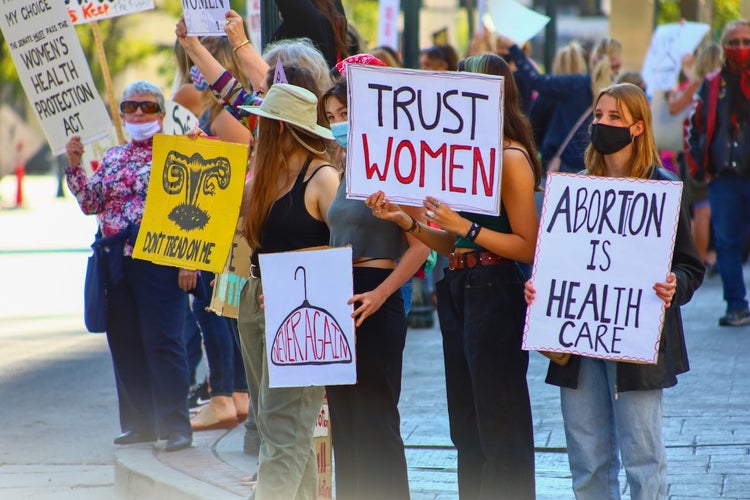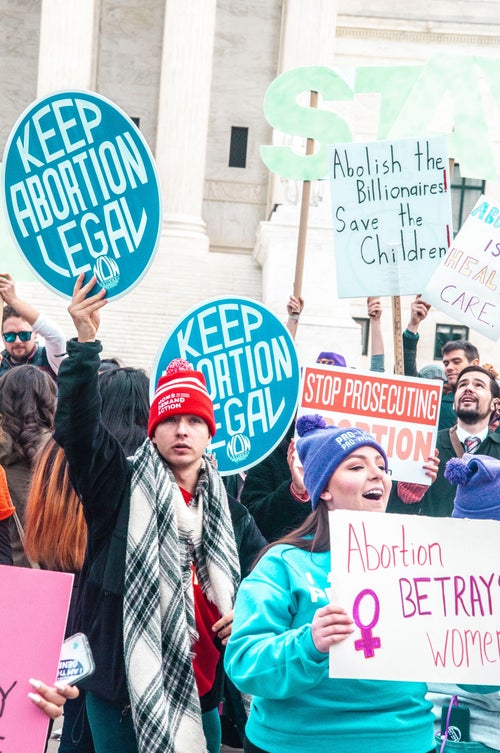Since Roe v. Wade was overturned in June, New York’s Democrats have worked to reassure concerned New Yorkers that the state will remain a safe haven for abortion. From Attorney General Letitia James to legislation signed by Governor Kathy Hochul, the phrase “safe haven” has been utilized frequently as a tool for assuring the public that reproductive rights are protected in the state. However, the work of truly making that safe haven a reality is ongoing. It doesn’t begin and end as a phrase for politicians to tweet, fundraise on, or enshrine in legislation — though I wish it were that simple.
Patients seeking reproductive care in New York — be they New Yorkers themselves or out-of-state patients traveling from states with abortion bans — often end up visiting clinics across the state in person. Unfortunately, the reality they may encounter is far from what you might expect a so-called safe haven to be. Clinic harassment is an all too common and traumatic experience for patients trying to access the health care to which they have a legal right. Members of the grassroots reproductive justice group NYC for Abortion Rights (NYCFAR) organize clinic defenses on the days anti-abortion protestors — such as those from the group Witness for Life — are scheduled to march. NYCFAR members also offer to escort patients from the subway to the clinic door safely (a role which also requires identifying anti-abortion protestors masquerading as fake “clinic escorts”). In short, these grassroots mobilizers are doing the work of creating the abortion safe haven reality that Democrats are prematurely proclaiming already exists in New York.
The Reproductive Justice Collective (RJC), a student-led advocacy coalition based at Columbia University and Barnard College, is another group that’s hard at work advocating to expand abortion access to all New Yorkers. I joined RJC as a member this summer, and though I’m not a student at Columbia or Barnard, the work of RJC extends beyond these campuses. One of RJC’s ongoing central projects is a statewide campaign for medication abortion pills to be made available on all New York college campuses.
In the wake of the overturning of Roe, many people have been spreading information about the abortion pills mifepristone and misoprostol on social media. The Plan C information campaign on abortion pills has been raising awareness about the safety of medication abortion and its accessibility as an option for those who live in restrictive states. The ability to order abortion pills by mail is a valuable alternative to visiting in-person clinics, given the harassment patients may face, and RJC understands the urgency of expanding that access even further to providing abortion pills on New York campuses.
Abortion pills are already available to students at the University of Illinois Chicago, and California law requires the state’s public universities to offer medication abortion on their campuses starting in January 2023. Public universities in Massachussetts are now required by law to start drafting plans to offer abortion pills on their campuses as well. It only seems right that New York should be next in offering abortion pills on their campuses, and this is the belief driving RJC’s work.
After all, it’s clear abortion access is widely favored by Americans, especially students, despite the attempts to restrict it. In a September 2022 Her Campus survey of 1,115 Gen Zers, it was found that 89% of respondents are pro-abortion, and 77% of respondents believe a person should be able to have a safe, legal abortion at any point during a pregancy for any reason.
RJC is lobbying New York’s legislators to follow the model of the California and Massachusetts bills and pass a similar bill in the New York state legislature. RJC has already had a major win at the campus level: Their advocacy at Barnard College led to the private university recently announcing it will begin training its campus healthcare providers to administer medication abortion starting in fall 2023. The pills will be covered by the college’s health insurance plan, and Barnard will also ensure emergency funding is available for uninsured students or students who do not want to use their parents’ insurance policies.
Despite winning abortion pill access on one of the group’s home campuses, the work of RJC is just getting started. The fact that a private institution has committed to offering medication abortion to its students is immensely helpful for the group’s lobbying efforts toward a state bill. RJC is working to have Assembly Bill A3322A passed, so that abortion pills can be made available to students on all New York public university campuses. The bill, sponsored by Assembly Member Harvey Epstein, would “[require] SUNY to offer abortion by medication techniques at all on-campus student health centers at colleges or universities within the SUNY system.”
Passing bill A3322A is an urgent issue for many reasons. As mentioned, the experience of visiting New York’s reproductive health clinics is often rife with harassment, adding additional stress and trauma to an already sensitive situation. Anti-abortion groups are often present at these clinics, attempting to invade them, shouting death threats at patients, or posing as fake escorts attempting to talk patients out of making their own decisions. There is often also police presence at clinics in New York, as anti-abortion protestors have police escorts when they have a permit to march there. This can further create an unsafe environment, especially for those who have been historically harmed by the police, such as people of color and transgender/gender non-conforming individuals.
Having abortion pills accessible in college health clinics would add a layer of safety for these groups to access reproductive care without the presence of harmful actors. Additionally, given the influx of out-of-state patients New York clinics are servicing due to abortion bans across the country, requiring abortion pills to be available on public university campuses would ease the unprecedented demand these clinics are now experiencing.
It’s with all of these benefits in mind that RJC is working to get funding for the state bill on Governor Hochul’s executive agenda. On Friday, Oct. 14, RJC lead and Barnard student Niharika Rao attended a roundtable meeting at the White House with other student advocates and Vice President Kamala Harris, who heard remarks from advocates fighting for reproductive justice in their states. This exciting visit placed RJC in a position to raise awareness about their work on New York state policy and make asks of the administration to support state-level medication abortion advocacy.
The work of grassroots groups like RJC and NYCFAR is a source of hope for many, given the hopelessness experienced after the Dobbs decision. In times that seem to be taking our country backwards, people will continue to recognize their own power and mobilize to create positive change. I felt a great sense of optimism at the Barnard announcement because I know the work of RJC brought about that success, and I have hope that through our continued lobbying efforts and support from state assembly members, we can truly create an abortion safe haven for all in New York.



